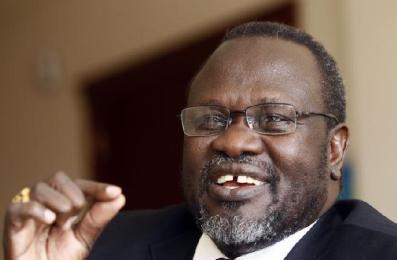IGAD proposed agreement encourages war in other two S. Sudan regions: rebels
June 12, 2015 (ADDIS ABABA) – South Sudanese rebels have reacted to key points of a draft final peace agreement with president Salva Kiir’s government which the East African regional bloc (IGAD) has proposed, describing it as an agreement only between Juba and greater Upper Nile region which would encourage the other two regions of Bahr el Ghazal and Equatoria to continue with the war.

Government takes 53% at the national level and 33% in greater Upper Nile. Former detainees and other political parties equally divide 14% at national level and 14% in Upper Nile region, particularly for those who belong to the three states of Upper Nile region.
The government will be 100% in full control of the other seven states of greater Bahr el Ghazal and Equatoria regions as IGAD proposed no power-sharing in the two regions.
The armed opposition faction of the Sudan Peoples’ Liberation Movement (SPLM-IO) led by former vice president, Riek Machar, in reaction to the proposal on Friday said the power-sharing deal only sought to bring back Upper Nile region to the government in order to fight against Bahr el Ghazal and Equatoria regions.
“This IGAD proposal is attempting to create further complications and conflicts in South Sudan. It is an agreement between the clique in Juba and Upper Nile region,” Machar’s spokesman, James Gatdet Dak, told Sudan Tribune on Friday.
“By ignoring the plights of people in the other two regions of Bahr el Ghazal and Equatoria, this will encourage the two regions to continue with the war against the government. The proposal is therefore a piece meal attempt to end the war only in Upper Nile region so as to team up with the regime in Juba and fight against the other two regions,” he said.
He said there was need to comprehensively address the critical challenges across the country and not do it “one piece at a time.”
Dak continued to elaborate on the views of the SPLM-IO leadership in order to make a peace agreement acceptable to all in the country, saying the IGAD proposed power-sharing ratios should apply in all the ten states of the country including at the county [district] levels.
He added that since president Kiir’s tenure in office ended on 21 May last month per the April 2010 elections, it was time to reach a comprehensive peace agreement to form a broad-based transitional government of national unity at national, state and county levels which should include participation of all the political parties across the country.
He also said federalism, as popular demand of the people of South Sudan since 1947, should be adopted in the peace agreement to be implemented during the transitional period by the would-be government of national unity, pending its incorporation into a permanent constitution.
The rebel spokesman also pointed out that an agreement that will not hold accountable leaders who were responsible for the Juba massacre in December 2013 and beyond and not provide for compensation and reparation of the victims and their lost properties will not be acceptable to all.
He also said the decision making threshold should be 75% in the executive and in the parliament in case of no consensus as previously agreed by the parties instead of the new IGAD proposed percentage of 67%.
Dak further explained that amalgamation process of the two armies, and other organized forces such as the police, wildlife and national security should be agreed upon and the process of amalgamation should take at least 24 months. He argued that the process should be gradual considering accompanying security sector reforms and transformation processes as the forces are being amalgamated unit by unit into one national army and police force.
Dak called on IGAD-PLus mediation to review the proposal and allow the parties to negotiate a peace agreement, saying the opposition group was committed to the peace process that would yield sustainable and lasting peace in the country.
Earlier, Machar’s spokesman said the opposition leader arrived in South Africa on Thursday per invitation extended to him to participate in the summit which will discuss South Sudan’s current situation and the peace process.
The top rival leaders are expected to further consult with IGAD and other five AU member states in Johannesburg on the way forward in the peace process which date for resumption is yet to be announced.
(ST)
